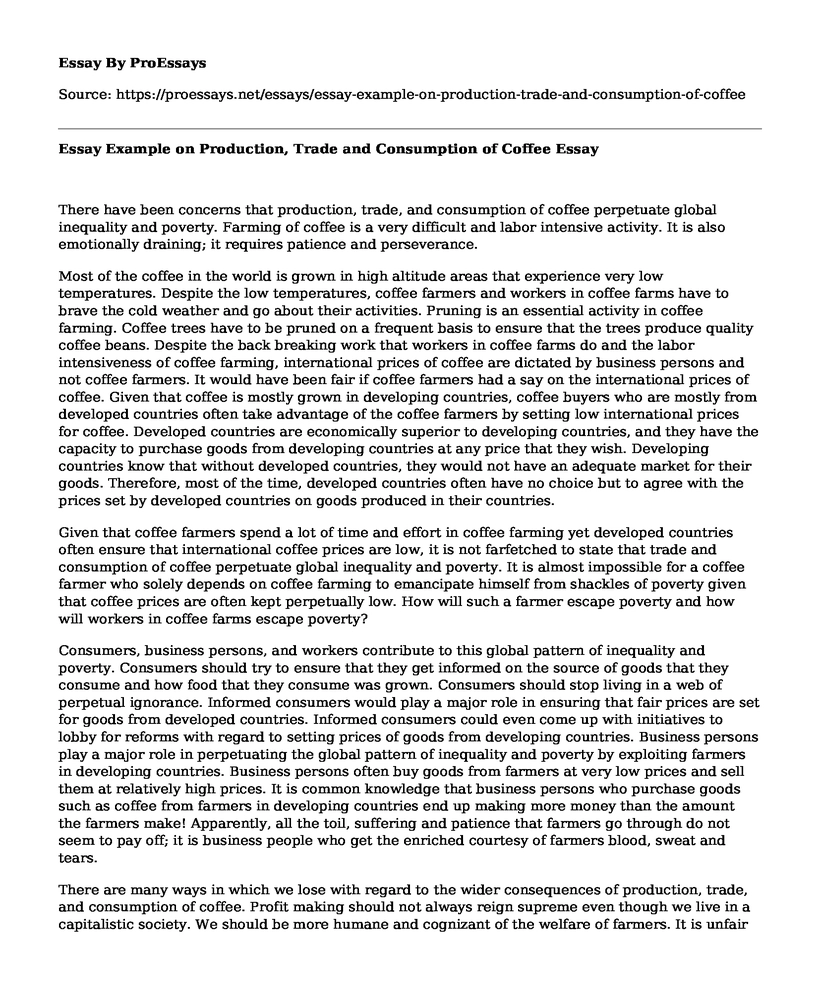There have been concerns that production, trade, and consumption of coffee perpetuate global inequality and poverty. Farming of coffee is a very difficult and labor intensive activity. It is also emotionally draining; it requires patience and perseverance.
Most of the coffee in the world is grown in high altitude areas that experience very low temperatures. Despite the low temperatures, coffee farmers and workers in coffee farms have to brave the cold weather and go about their activities. Pruning is an essential activity in coffee farming. Coffee trees have to be pruned on a frequent basis to ensure that the trees produce quality coffee beans. Despite the back breaking work that workers in coffee farms do and the labor intensiveness of coffee farming, international prices of coffee are dictated by business persons and not coffee farmers. It would have been fair if coffee farmers had a say on the international prices of coffee. Given that coffee is mostly grown in developing countries, coffee buyers who are mostly from developed countries often take advantage of the coffee farmers by setting low international prices for coffee. Developed countries are economically superior to developing countries, and they have the capacity to purchase goods from developing countries at any price that they wish. Developing countries know that without developed countries, they would not have an adequate market for their goods. Therefore, most of the time, developed countries often have no choice but to agree with the prices set by developed countries on goods produced in their countries.
Given that coffee farmers spend a lot of time and effort in coffee farming yet developed countries often ensure that international coffee prices are low, it is not farfetched to state that trade and consumption of coffee perpetuate global inequality and poverty. It is almost impossible for a coffee farmer who solely depends on coffee farming to emancipate himself from shackles of poverty given that coffee prices are often kept perpetually low. How will such a farmer escape poverty and how will workers in coffee farms escape poverty?
Consumers, business persons, and workers contribute to this global pattern of inequality and poverty. Consumers should try to ensure that they get informed on the source of goods that they consume and how food that they consume was grown. Consumers should stop living in a web of perpetual ignorance. Informed consumers would play a major role in ensuring that fair prices are set for goods from developed countries. Informed consumers could even come up with initiatives to lobby for reforms with regard to setting prices of goods from developing countries. Business persons play a major role in perpetuating the global pattern of inequality and poverty by exploiting farmers in developing countries. Business persons often buy goods from farmers at very low prices and sell them at relatively high prices. It is common knowledge that business persons who purchase goods such as coffee from farmers in developing countries end up making more money than the amount the farmers make! Apparently, all the toil, suffering and patience that farmers go through do not seem to pay off; it is business people who get the enriched courtesy of farmers blood, sweat and tears.
There are many ways in which we lose with regard to the wider consequences of production, trade, and consumption of coffee. Profit making should not always reign supreme even though we live in a capitalistic society. We should be more humane and cognizant of the welfare of farmers. It is unfair for us to buy goods at cheap prices yet farming and production of those goods is expensive.
There are many ways in which we can mitigate these problems. Prices of goods such as coffee should not be solely set by business persons. Farmers should be involved in setting prices of such goods. Participation of farmers in setting up prices of goods that they produce will play a major role in ensuring that farmers are fairly compensated for their efforts. Business persons should stop exploiting farmers and compensate them fairly for their goods. Fair prices will ensure that farm workers are fairly compensated, and it will also ensure that farmers make a decent profit from their farming activities. Putting the above-mentioned measures in place will play a major role in putting an end to global inequality and poverty.
Cite this page
Essay Example on Production, Trade and Consumption of Coffee. (2021, Jun 22). Retrieved from https://proessays.net/essays/essay-example-on-production-trade-and-consumption-of-coffee
If you are the original author of this essay and no longer wish to have it published on the ProEssays website, please click below to request its removal:
- Salary Negotiation With a Potential Employer Essay Example
- The Influence of Western Fashion on People Across the Globe
- Employee Training & Development: Essential for Improving Organizational Performance - Essay Sample
- Essay on Retail: Connecting Wholesalers and Consumers for a Successful Economy
- Toys R US: Repositioning, Current Trends, and Consumer Profile - Essay Sample
- Essential Qualities for New Employees: Beyond Programming & Coding - Essay Sample
- Solar Energy Production Surges: 3X More Employees than Oil, Gas, and Coal - Paper Sample







